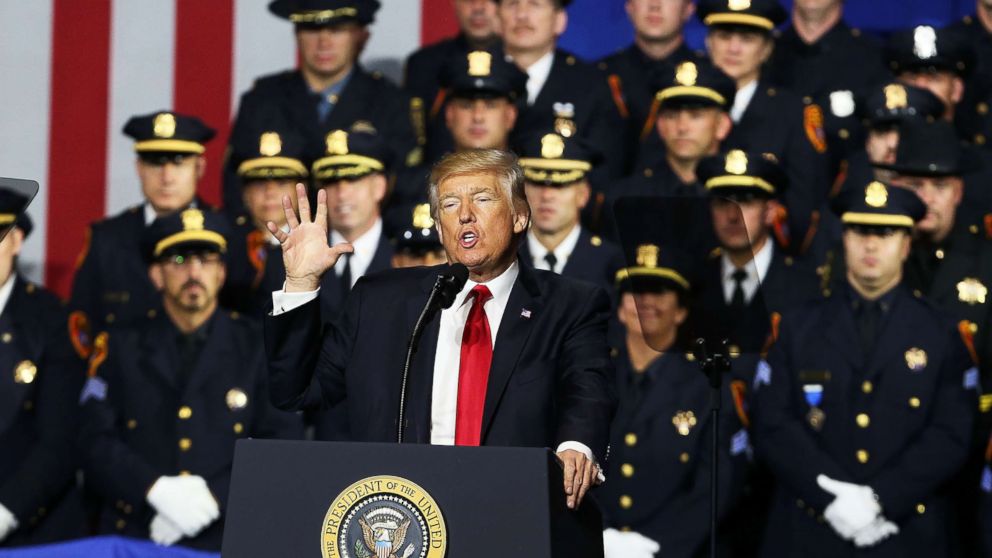287(g) and Beyond: How a Second Trump Administration Could Deputize Local Police to Carry out Federal Immigration Goals
If re-elected, an emboldened Trump will continue to push the limits of executive authority over local law enforcement, and American communities will suffer.

"President Donald Trump speaks at Suffolk Community College, July 28, 2017, in Brentwood, New York." Courtesy of Spencer Platt/Getty Images.
During last month’s presidential debate ahead of the upcoming November 2024 U.S. election, ABC News host David Muir prompted former President Donald Trump to speak on his ambitious plan to deport over 11 million undocumented immigrants if re-elected:
“President Trump, you called this the largest domestic deportation operation in the history of our country. You say you would use the National Guard. You say if things get out of control, you’d have no problem using the U.S. military–”
“With local police,” Trump interrupted.
Many have raised alarm about Trump’s mass deportation plan. Critics have argued it would be too expensive, that it would be a logistical nightmare, and that the deployment of the National Guard would cause chaos in American cities and towns. All of that is true. But the most harrowing consequence of this plan is the promise to weaponize executive power over local police.
To understand Trump’s promise to enlist local police to carry out his mass deportation plan, it is crucial to examine what the Trump administration did previously and what they could do to mobilize local law enforcement in a potential second term.
Last Time Around
Only five days after President Donald Trump took office, on January 25th, 2017, he passed Executive Order 13767: Border Security and Immigration Enforcement Improvements. The stated purpose of this order was to “direct executive departments and agencies to deploy all lawful means to secure the Nation’s southern border,” including through cooperation with “States and local law enforcement in enacting Federal-State partnerships to enforce Federal immigration priorities,” and to ensure that local police agencies “are consistent with Federal law and do not undermine Federal immigration policies.” In practice, it offered an avenue for the administration to forge more relationships with local police agencies and incentivize departments to advance the goals of ICE and the Trump White House.
EO 13767 also re-articulated the power of the 287(g) program, first established as part of the Illegal Immigration Reform and Immigrant Responsibility Act of 1996 (IIRAIRA). This program allows the Secretary of Homeland Security to form partnerships with local law enforcement agencies through Memorandums of Understanding (MOAs), enabling local officers to perform tasks typically reserved for federal immigration officials.
Trump’s early executive order declared that “To the extent permitted by the law, and with the consent of State or local officials as appropriate, the Secretary shall take appropriate action, through agreements under section 287(g) of the INA, or otherwise, to authorize state and local law enforcement officials…to perform the functions of immigration officers in relation to the investigation, apprehension, or detention of aliens in the United States.” From his very first week in office, Trump and the administration articulated their plan to drastically ramp up the deputization of local police forces to act as federal agents through the 287(g) program.
287(g) agreements are voluntary: local departments can choose to enter into MOA’s with DHS. Historically, relatively few local departments do. Towards the end of President Barack Obama’s second term in late 2016, there were only 32 287(g) programs in place between DHS and local police departments. By November 2017, the Trump administration had nearly doubled the number of 287(g) partnerships, with 60 departments participating. Ultimately, 126 new agreements with local police agencies were signed under the Trump administration by 2020. By the time Trump left office in 2021, 146 local police departments were in active 287(g) agreements with the federal government.
The Biden Administration has slowed the expansion of the 287(g) program, largely in response to experts and advocates who point out the harms of local police carrying out federal duties. In many instances, 287(g) programs have been exceedingly costly for participating local law enforcement departments, both in terms of financial burden and relationship with local communities.
In 2018, the Center for American Progress found that, due in part to the increased workload brought upon individual officers due to the demands of the 287(g) program, local police departments that willfully entered into 287(g) were exceeding their budgets to cover overtime for local officers enforcing immigration priorities.
The Office of the Inspector General reported in 2018 that local officers in the 287(g) program have not received adequate training to carry out federal immigration aims. Mistreatment of community members by 287(g) ordained officers has led to costly lawsuits for local police departments about the program. In Maricopa County alone, the police department had to pay millions of dollars in litigation fees for 287(g)-related cases.
In 2021, the Office of Government Accountability found that ICE does not “have an oversight mechanism for the partner agencies” in its 287(g) program model. Without adequate supervision, local law enforcement officers are emboldened to act–arrest, deport, and intimidate– with unchecked federal power over local populations.
Trump’s Second Term: New and Renewed Threats
The debate was neither the first nor last time that former President Trump explicitly shared his plans for enlisting local police officers to carry out this massive deportation plan. In February 2024, Trump told Fox News’s Sean Hannity that local police “understand who these migrants are. They know them by their first name, their last name, and they know where they come from. It’s going to be local police who are going to turn them over, and we are gonna have to move [the migrants]back to their country.”
He’s repeated these sentiments along the campaign trail. In March 2024, Trump put the duty to carry out his mass deportation plan squarely on local law enforcement, stating that “it’s not a Washington thing, it’s the local police.” The following month, Trump told a rally that he would “work out a federal immunity” for local sherriffs and police officers to carry out his mass deportation plan unchecked.
Trump’s proposed weaponization of local police officers to execute his mass deportation plan is not just a personal mission or a Trump-ism to brush aside. It’s a policy priority of the Republican Party Platform. Under the subtitle “Carry Out the Largest Deportation in American History,” the Party states: “We must deport the millions of illegal migrants who Joe Biden has deliberately encouraged to invade our Country. We will start by prioritizing the most dangerous criminals and working with local Police.” Given the Republican Party’s unity around this issue, it is safe to assume that if given the chance to retake the White House, they will push the bounds of federal power over local police departments to achieve extreme deportation goals.
More Levers to Pull
In addition to picking up where they left off with the expansion of the 287(g) program, the Trump administration could conceivably exercise executive power over local police departments to carry out mass deportation in little-known and indirect ways.
“Any federal law enforcement agency can request that the U.S. Marshals Service provide federal deputy status to local law enforcement,” wrote U.S. policing expert and director of the University of Virginia Law School’s Center for Criminal Justice, Rachel Harmon, in a piece for the NYU Law Review. “This delegation of authority permits the deputized officer to enforce all orders of federal courts and to make arrests without warrants for federal crimes, powers otherwise unavailable to local police officers.” All U.S. Marshals Service personnel must do to deputize a local police officer is obtain a letter from a federal agency to the Marshals Service granting the local officer status to act on the government’s behalf for the length of the investigation. The process is quick and, as Harmon describes, “trivially easy.”
A second Trump term, with an administration eager to deliver on its promise to deport millions of undocumented immigrants, is likely to exercise all possible avenues to deputize local officers to act as ICE agents. Under both the 287(g) program and the Marshals Service, large numbers of local officers acting as federal law enforcement could be empowered to make arrests with little to no accountability for their actions. Indeed, Trump has already promised immunity to local police officers.
Possible Safeguards
Although the reality of the 287(g) program and the prospect of a ramped-up U.S. Marshals Service are threatening examples of direct federal power over local police agencies, there are existing preventive measures that may hinder this doomsday scenario from coming to fruition.
Most federal directives are limited to only implicit power over local law enforcement. Through federal funding incentives, information-sharing recommendations, and technical assistance, the federal government can influence local policing but cannot override the local jurisdictions to dictate police action. Although 287(g) agreements reached a peak by the end of the Trump administration in 2021, 99% of local police departments are not in active, direct partnership with the federal government, and only 10% of local police departments receive federal funding.
During the last Trump administration, localities began to define themselves as sanctuary cities in opposition to Trump’s aggressive deportation rhetoric and attempts. Sanctuary communities––cities, counties, and states––are known for their refusal to honor ICE requests to detain undocumented immigrants or otherwise cooperate with federal deportation efforts. Many sanctuary cities also vow not to deputize their officers as federal agents.
Trump recognizes that sanctuary cities threaten his plans––on the campaign trail, he’s promised to call on Congress to outlaw sanctuary cities nationwide and to otherwise punish jurisdictions that refuse to cooperate with ICE. Sanctuary cities, then, may prove an effective method of rejecting federal power over local law enforcement. Should Trump return to office, a revival of the sanctuary city movement could serve as a barrier between Trump and his promised 11 million deportations.
Conclusion
At Trump’s most recent campaign rally in New York, he promised the crowd: “On day one, I will launch the largest deportation program in American history… I will rescue every city and town that has been invaded and conquered, and we will put these vicious and bloodthirsty criminals in jail. Going to kick them the hell out of our country as fast as possible.” He was met with a roar of applause.
If re-elected, an emboldened Trump in his second term will continue to push the limits of executive authority over local law enforcement, attack and punish sanctuary cities and jurisdictions that oppose his values, and utilize all means available to achieve his goals. For sanctuary cities and jurisdictions opposed to these policies, the coming years could require renewed resistance to safeguard the autonomy of local law enforcement and protect immigrant communities from unprecedented federal intervention.
Trump’s fantasy has become the dream of his base: a January 20th, 2025 on which local police officers across the United States violently crackdown on their neighbors with complete impunity. Through the methods explained above, it seems possible that an unchecked President Trump could make this dream a reality, creating a nightmare for vulnerable individuals and communities nationwide.
Editors
Cameron Roberts, Managing Editor
Makenzie Rodrigues, Copy Editor

Maya Nir (she/her) is a first year MA candidate in International Relations at NYU. She received her BA in Political and Social Thought at the University of Virginia, where she wrote her senior honors thesis on Transitional Justice in Tunisia after the Arab Spring. She also studied Arabic and French languages. Maya was previously the Media Relations Coordinator for Foreign Affairs Magazine and part of the Global Communications and Media Relations team at the Council on Foreign Relations in New York. She is now an editorial assistant at Just Security. When not working, she enjoys playing Ultimate Frisbee and sampling bakeries around Brooklyn.




